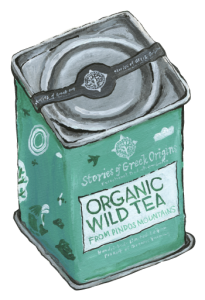Ari Talks About Greek Mountain Tea
What’s in your cup?
Sitting in a café in the town of Metsovo in northern Greece many years ago, I innocently ordered tea. I was expecting the usual uninteresting bag of commercial black tea that I’ve come to expect almost everywhere in Europe. But before the waiter could leave the table, my late but much-loved friend Daphne Zepos (see the Epilogue in Zingerman’s Guide to Good Leading. Part 3 for much more on this amazing woman) asked me if I wanted “regular tea or mountain tea?” Never having heard of the latter, but ever the inquisitive eater and drinker, I shrugged my shoulders and said, “Why not? I’ll try mountain tea.
A few minutes later it arrived—a bouquet of long light green stalks with tiny flowers and buds attached steeping hot water. Its aroma was excellent—a little sweet, a touch of mountain meadow. It has light amber color and a compelling, sweet perfume and a lovely, light, naturally sweet flavor that hints of thyme, lemon and anise.
In Greek, the mountain tea is known as tsai tou vounou (“TSAH-ee too voo-NOO”). After literally months of trying to find out the English name I’ve gotten that what they serve is called Diktamus. Others have said it’s actually called Sideritis or ironwort. It’s a hardy, flowering perennial that’s well suited to survive with only minimal water and rocky soil. Whatever it is, it’s worth trying if you’re looking for an herbal brew to experiment with. To brew it, you simply break up the branches, then boil them for about 5 minutes in water, then strain and serve. Like some green and oolong teas, you can get more than one brew from each bunch of buds.
Our terrific Greek mountain tea is coming through our new-found food friend, Vivianna Karamanis, who’s got an eye and a palate for extremely excellent products (try some of the roasted pepper-tomato sauce we’re getting from her at the Deli). This wild Greek Mountain tea is from the Pindos mountains in northwest Greece, where it’s gathered by hand over 3000 feet up. Only the flowers and the small bit of the most tender stems are used. More commercial brands will include much longer pieces of stem which also tend to woodiness and are less sweet.
It brews up into a light golden liquid that has a naturally sweet flavor. In Greece it’s consumed as much for health as for pleasure. It’s an old school remedy for colds, muscle pain, and more. Wild grown herbs like this are generally acknowledged to be more potent in that regard—the cultivation of plants doesn’t quite replicate what happens when nature is left to her devices. The high altitude growth tends to concentrate essential oils even further. Vivianna’s mountain tea is also certified organic. Many Greeks like to add a bit of thyme honey to sweeten it further but I drink it as it is. Great with a bit of a biscuit from the Bakehouse or some toast and jam.





Zingerman’s Art for Sale